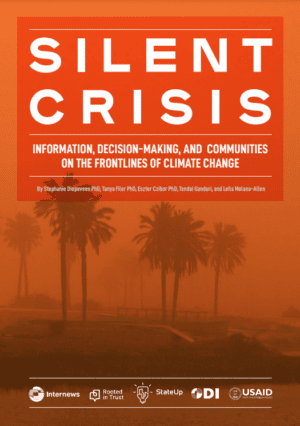This report delves into the often-overlooked realities faced by communities on the frontlines of climate change within humanitarian contexts. Recent severe climate events have exacerbated humanitarian crises, prompting a need to examine local information environments. This study aims to uncover whether these environments are evolving to support decision-making amidst escalating climate change impacts, emphasizing the link between access to relevant and localized information and informed choices within such crises.
Despite global attention on climate change, there’s a knowledge gap in understanding the information needs of high-risk communities. This report provides empirical insights into informational contexts, needs, and preferences within humanitarian settings, encompassing various information actors.
The report focuses on two case studies: central and southern Iraq and southwestern Zimbabwe, regions experiencing visible climate change impacts alongside humanitarian crises. These areas have received limited research attention regarding citizen experiences, beliefs, and perceptions of climate change impacts and responses. Our detailed case studies examine existing information environments, beliefs, narratives, and trust dynamics influencing people’s engagement with climate-related information in these regions.
Based on these findings, the report suggests five key focus areas for effective information-based interventions, and suggests specific actions that different actors, from humanitarian organizations to journalists and policymakers, can take to respond to each. The focus areas are:
- Facilitating better connectivity between local, national, and global climate conversations.
- Strengthening access to, co-production of, and engagement with actionable and locally relevant
information. - Understanding trust in information sources as dynamic and negotiable.
- Recognizing the limitations of individual behavioral change as a mechanism for adapting to climate impacts.
- Financing the climate crisis holistically, with communications as an integral part.
